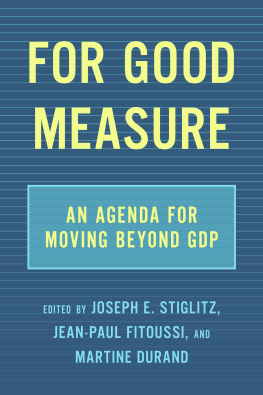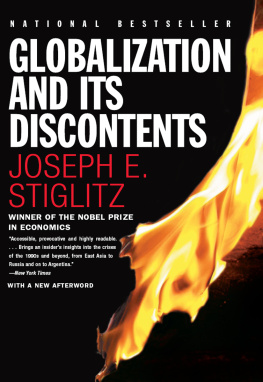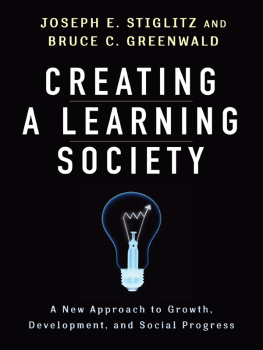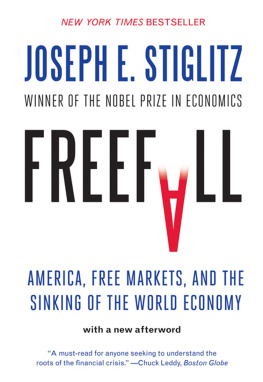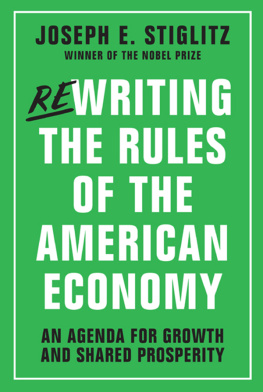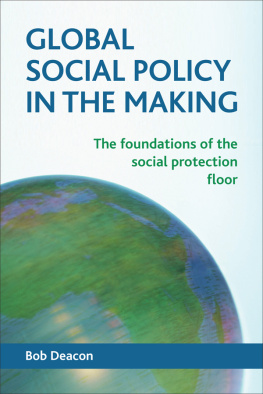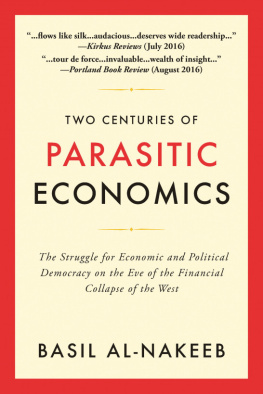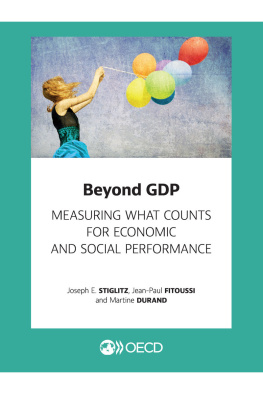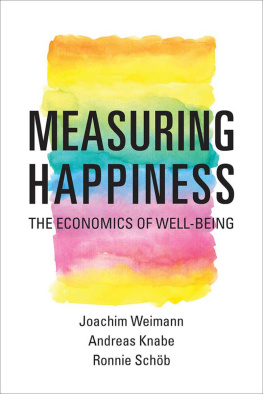
FOR GOOD
MEASURE
AN AGENDA FOR MOVING BEYOND GDP
EDITED BY
JOSEPH E. STIGLITZ, JEAN-PAUL FITOUSSI, AND MARTINE DURAND
This report is dedicated to the memory of Alan B. Krueger.
Alan played a central role in the Commission on the Measurement of Economic Performance and Social Progress and in the High-Level Expert Group, especially through his work on subjective well-being and the ways it links to other life domains.
Brilliant academic, dedicated public servant, valued colleague, and dear friend, he helped transform the understanding of labor markets, showing (with David Card) that an increase in minimum wage does not have the adverse employment effects previously claimed. He brought his deep economic insights, combined with his strong focus on data, into the realm of policy when he served as Chairman of President Obamas Council of Economic Advisers, where he advocated for policies that promote equality and opportunity.
Alan understood the power of economics to transform our societyto reduce human suffering and to improve societal well-being. He dedicated his life to these lofty goals.
We will sorely miss him. He was more than a brilliant mind; he was above all a good person who sincerely cared for people.
CONTENTS
by Joseph E. Stiglitz
Elizabeth Beasley
Ravi Kanbur, Ebrahim Patel, and Joseph E. Stiglitz
Nora Lustig
Carmen Diana Deere, Ravi Kanbur, and Frances Stewart
Franois Bourguignon
Facundo Alvaredo, Lucas Chancel, Thomas Piketty, Emmanuel Saez, and Gabriel Zucman
Arthur A. Stone and Alan B. Krueger
Jacob S. Hacker
Marleen De Smedt, Enrico Giovannini, and Walter J. Radermacher
Yann Algan
INTRODUCTION
While news media constantly report on whats happening to GDPthe measure of the total value of the goods and services produced within a countryfew today believe that number provides an adequate picture of how well an economy or society is doing. In the aftermath of the Great Recession of 2007 to 2009, as the upbeat GDP numbers reported by the US government seemed to show a recovery, some suggested that government employees must be lying. If only a tiny part of society benefits from growth while the vast majority sees conditions worsen, people are not going to believe triumphant reports on the economic situation. But the government was accurately reporting what the measure said. The problem was with the measure itself. In the US, a closer look at the numbers showed that some 91% of the increase in national income went to the top 1% in the years between 2009 and 2012, so for nearly all Americans, there was no recovery. Thats why the GDP number was misleadingand it misled some policy-makers into thinking the economy was well on the mend.
Even before the Great Recession and the euro crisis, some economists, politicians, and policy-makers were not happy with GDP as a measure of economic performance. Thats what motivated President Nicolas Sarkozy of France in 2008 to organize an international Commission on the Measurement of Economic Performance and Social Progress, which I co-chaired with Jean-Paul Fitoussi, a distinguished economist at Sciences-Po Paris. Nobel Prize winner Amartya Sen served as an advisor. The Commissions report, issued in 2009 and published in 2010 in the US under the title Mismeasuring Our Lives: Why GDP Doesnt Add Up, had enormous impact (including thousands of academic citations). It also strengthened a global academic and civil society movement sometimes referred to as the beyond GDP movement that focuses on all the dimensions of well-being, including inequality, insecurity, and sustainability, which are largely ignored by GDP metrics.
The OECD had long tried to improve our statistical base for assessing economic performance. Indeed, in 2004, well before the formation of the Commission on the Measurement of Economic Performance and Social Progress, the OECD held its first World Forum on Statistics, Knowledge and Policy in Palermo, Italy, which focused on key indicators of success. Enrico Giovannini, then Chief Statistician for the OECD and a member of both the Commission and, later, the High-Level Expert Group hosted by the OECD, was the driving force behind the conference.
In 2011, under the leadership of its new Chief Statistician, Martine Durand, the OECD launched its Better Living Initiative, presenting in a flagship report entitled Hows Life? Measuring Well-Being, a much broader set of indicators of economic performance and social progress, and enabling individuals to build an index of economic and social performance (the Better Life Index) based on their own values, weighing different dimensions of what makes for a good economy and society.
Then, in 2013, the High-Level Expert Group (HLEG) hosted at the OECD was established to continue the work of the Commissionin particular, to pick up on some of the many important subjects the Commission had suggested required more work. The OECD provided enormous institutional and intellectual support, without constraining in any way the work of the Commission, and for that we are very grateful. The group was chaired by Martine Durand, the chief statistician of the OECD, Jean-Paul Fitoussi, and me.
We decided to expand our membership beyond the distinguished group of academics that had constituted the Commission to include heads of some of the key national statistical offices around the world, to increase the chance that our ideas would be both implementable and implemented.
And rather than attempt to write a consensus report, we decided to publish our results in two forms, a chairs summary (in a companion volume entitled Measuring What Counts: The Global Movement for Well-Being) and the chapters of this volume, which present research results in some of the key areas discussed by the HLEG and written by one or more members of the group, often together with some of their colleagues.
The importance of the areas explored by the HLEG, and the deficiencies in GDP, should be obvious. Four of the chapters deal with different aspects of inequality, a key issue of the day. My earlier remarks highlighted the importance inequality plays in assessing economic performance: GDP can be going up even while most individuals in society can see their incomes stagnating or declining. This kind of economy is not a well-performing economy, and unfortunately it didnt just happen in the aftermath of the Great Recession. In the US, its been the case for more than a quarter century.
Agreeing on precisely whats going on turns out to be difficult, partly because of the kind of measurement problems the HLEG focused on. Measuring income is difficult enough, but any assessment of well-being needs to take into account goods and services received from the government (health and education benefits, for example), often received in kind. These are hard to value. For instance, because prices in health care in some countries (such as the US) have, over long intervals, gone up far faster than prices in general, government spending on health benefits for the poor, for example, could have gone up significantly and yet the real benefits received decreased.
addresses the difficult issue of reconciling data on the distribution of income with standard data on national incomes through what are called distributional national accounts. A variety of advances in both methodology and technology have provided us with better tools with which to do this. Most importantly, we have been able to collate data from different sources, including administrative data (such as tax records) and from surveys.
Next page
